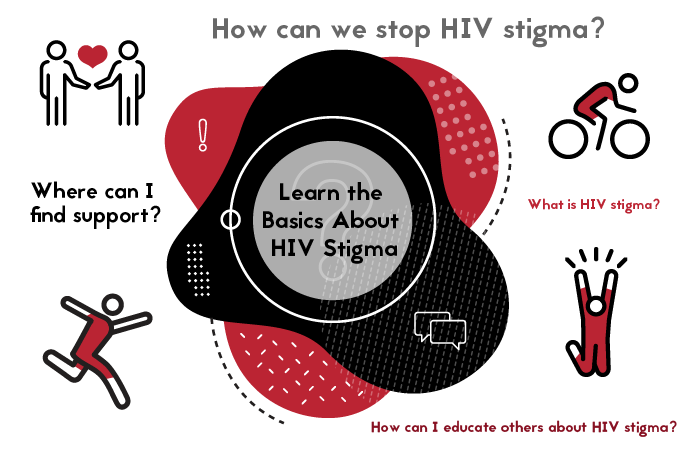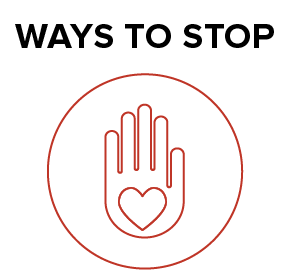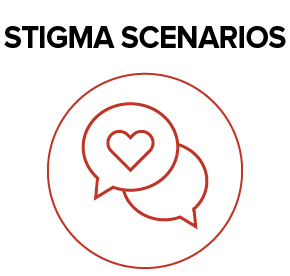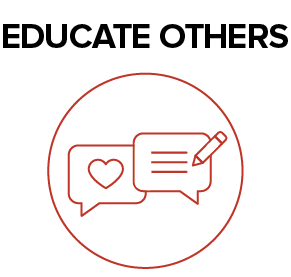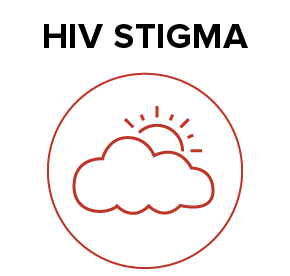Stigma Scenarios: Support in Action
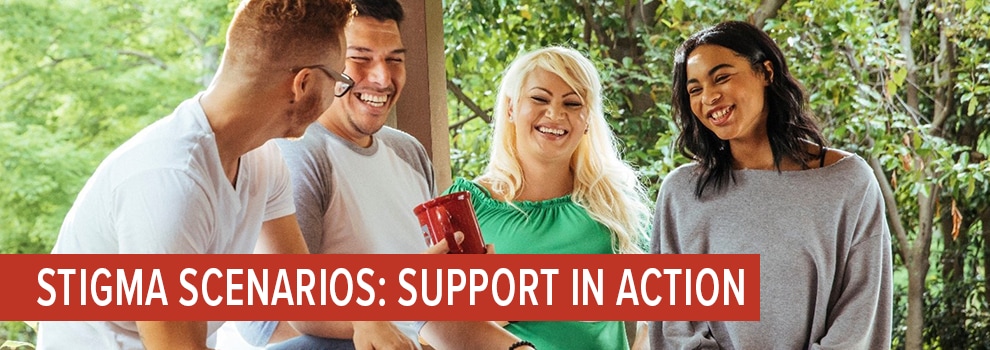
Know what to do when you witness HIV stigma. The first step to stopping HIV is talking openly about it and addressing stigma head on. It is important to speak up and take action when you witness others behaving in ways that are stigmatizing.
But it can be hard to know what to say or do. Many of us struggle with how best to address HIV stigma and discrimination when we experience it. Check out some tips below for ways to act against stigma in everyday situations.
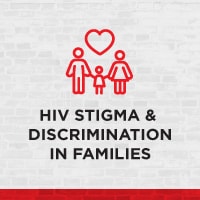
Scenario:
You arrive to a family reunion picnic with your sister who recently shared with the family that she was diagnosed with HIV. As you make your way around to say hello and offer hugs to family members, your cousin hesitates when greeting your sister, commenting “I’m not going to get it am I?”
What you can do:
- Model positive behavior by hugging your sister.
- Share HIV basics, including facts about how HIV is transmitted. “I’m not sure if you know, but HIV is not spread by hugging, shaking hands, or socially kissing someone who has HIV. HIV can’t survive outside the body.”
- Offer to have a conversation and answer any other questions she might have about HIV.
- Follow up later with an email or text that links to educational resources.
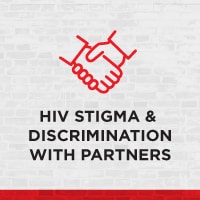
Scenario:
You are dating a new girl and things are getting more serious. You decide that it is time to share with her that you have HIV. When you tell her, she gets angry and says she doesn’t understand why you didn’t just date someone who was already sick.
What you can do:
- Whether you choose to pursue a relationship or not, this is an opportunity to stand up to HIV stigma and raise awareness of how hurtful it can be.
- Acknowledge that you know that learning a partner has HIV can be surprising. But let her know that it wasn’t easy for you to share your status with her because her reaction isn’t unusual.
- Use the opportunity to correct her stigmatizing language. You can say, “It really isn’t appropriate to call people with HIV “sick.” I’d appreciate if you used the phrase “people with HIV” instead.” Let her know that with proper treatment, people with HIV can live long and healthy lives.
- Explain that someone with HIV who takes their HIV medicine as prescribed and gets and keeps an undetectable viral load will not transmit HIV to their sex partners. Encourage her to learn more about HIV and other prevention strategies used when one member of a couple has HIV and the other does not, including condoms and pre-exposure prophylaxis or PrEP.
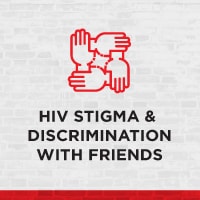
Scenario:
Your friend gathers you and several other friends to disclose he has HIV. One friend’s first reaction is, “How did you get it and do you know who gave it to you?”
What you can do:
- Redirect the conversation by showing empathy and saying, “We’re just happy you felt comfortable sharing this with us. Do you want to talk more about how you’re feeling?”
- Ask your friend if he has sought treatment. If not, offer to go with your friend to visit his doctor to explore his options for treatment.
- Later, talk to your friend who posed the question and explain that asking about transmission is insensitive. This would be a good time to explain what HIV stigma is and how it can be a barrier to treatment for those with HIV. Try not to pass judgement; instead show empathy as you help them learn more.
- Learning more about HIV is one of the first steps to support your loved one in living a healthy life with HIV. Educate yourself about the basic facts about the virus, how it is transmitted, and treatment options available to those with HIV.
Communicating openly and asking questions about HIV is important to promote learning and understanding of HIV. But remember, we have to do our part in being thoughtful and supportive—rather than stigmatizing or being offensive— in our responses to situations of HIV disclosure or misunderstandings about HIV.
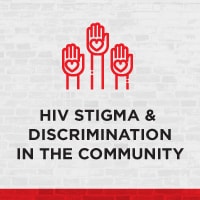
Scenario:
During your weekly basketball league game, the subject comes up of a team member sharing on Facebook that he was going to get an HIV test. This individual is absent from the game this day. Several negative and judgmental comments are expressed by your fellow teammates.
What you can do:
- Share the last time you were tested for HIV and ask him if he’s thought about getting tested, too. Explain that HIV testing is a normal and routine part of health care and knowing your status is important because it helps keep you healthy.
- Explain to the team that they are contributing to HIV stigma when making judgements about people who take steps to prevent HIV transmission. Let them know that these types of stigmatizing remarks can lead people to being afraid of what people will say and less likely to get tested for HIV.
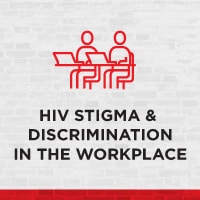
Scenario:
A friend at work remarks to you that another co-worker shouldn’t be participating in the office potluck because he has HIV. How do you respond?
What you can do:
- Respond to your friend’s misconception kindly by explaining the facts. “You don’t need to worry. You can’t get HIV from eating food handled by a person with HIV.
- Help your friend understand that refusing casual contact with someone with HIV is a form a stigma.
- Model positive behavior by eating the food your co-worker with HIV brings to the potluck. Have lunch together regularly and check in with your co-worker to ensure he isn’t feeling isolated.
